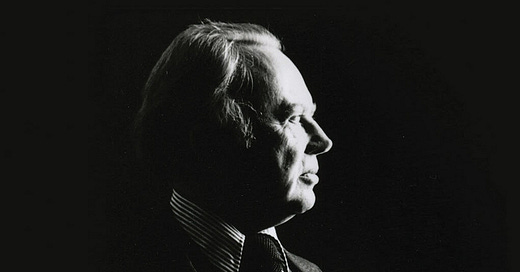Classic Liberal Comebacks to Conservative Russell Kirk
Battle of Ideas
Russell Kirk became the intellectual backbone of American conservative thought in the mid to late twentieth century, restating the views of the latter period of Edmund Burke’s life: rich with tradition, cautious in action, and deeply sceptical of human hubris.
While his ideas resonate with conservatives, classical liberals offer a dynamic counterpoint, championing freedom, innovation, and individual choice over reverence for the past.
Let’s dive in and see how these two visions clash — and sometimes align — in the battle of ideas.
Classical liberals see a brighter path where
freedom, innovation, and individuality take centre-stage.
1. Morality
Kirk’s Claim
A timeless moral order, grounded in religion or natural law, shapes the universe. To stray from it is to invite chaos.
Classical Liberal Response
Of course morality matters—but whose morality? The beauty of liberty is letting individuals find the moral tradition of their choice, or not, as long as they don’t trample on the rights of others. Forced adherence to one moral order does not permit the free will bestowed on us.
2. Tradition
Kirk’s Claim
Human existence is a tapestry of traditions, mysteries, and customs that deserve our respect.
Classical Liberal Response
Traditions can be wonderful, but let’s not wrap them in bubble wrap. If customs no longer serve us, let’s voluntarily innovate. Progress doesn’t mean erasing history—it means freely building on it without being chained to it.
3. Hierarchies
Kirk’s Claim
Hierarchies are natural, fostering stability and a sense of duty.
Classical Liberal Response
Natural? Maybe. Necessary? Hardly. Hierarchies should be earned, not inherited. Let merit, not birthright or tradition, determine who leads and who follows. Liberty thrives when everyone gets a fair shot.
4. Private Property
Kirk’s Claim
Property rights anchor freedom and bind people to their communities.
Classical Liberal Response:
Property is sacred — but not because it ties you to the community, but because it stems from self-ownership. Let’s defend property from all threats, especially meddling states that “know best.”
5. Customs
Kirk’s Claim:
Customs and conventions are society’s foundation, providing stability and identity.
Classical Liberal Response:
Stability is great, but not at the expense of liberty. Some customs deserve to fade if they stand in the way of equal opportunity, freedom, or progress. Traditions should evolve naturally, not be frozen in time.
6. Pace of Change
Kirk’s Claim:
Sudden change destabilises society. Prudence demands reform happen gradually.
Classical Liberal Response:
Gradual change is fine — unless injustice is screaming for a fix. Why crawl when running is faster? Sometimes society needs a jolt to tear down barriers to freedom and opportunity. Now sounds good.
7. Restraint
Kirk’s Claim:
Left unchecked, human passions spiral into chaos. Society needs guardrails.
Classical Liberal Response:
Guardrails? Sure, but self-imposed ones. Free individuals can manage their passions without the heavy hand of tradition or authority. Let personal responsibility—not paternalism—be our guide.
The beauty of liberty
is letting individuals find the moral tradition of their choice
8. Coercion
Kirk’s Claim:
Conservatives distrust concentrated power and prefer decentralised authority.
Classical Liberal Response:
Amen to that! But let’s not stop at the state. Employers, the media, the church, crime syndicates, vexatious litigants, stalkers, trespassers, even nosey neighbours can also wield power oppressively. True liberty means vigilance against all forms of coercion, wherever they lurk.
9. Permanence v Progress
Kirk’s Claim:
Good society walks a tightrope between enduring truths and necessary changes.
Classical Liberal Response:
Why tiptoe when you can stride boldly toward progress? Permanence often masks stagnation. Liberty flourishes when we embrace change, guided by the timeless principle of individual freedom.
10. Prudence v Boldness
Kirk’s Claim:
Careful deliberation is essential for wise governance.
Classical Liberal Response:
Prudence, yes. Paralysis, no. Being cautious is fine, but let’s not use it as an excuse to cling to restrictive systems or delay justice. Sometimes boldness is the wisest course.
The Bottom Line
Kirk’s conservatism prioritises stability, tradition, and cautious change. Classical liberals see a brighter path where freedom, innovation, and individuality take centre-stage. While Kirk builds fences to protect what is, classical liberals dream of bridges to what could be—a world where liberty is not just preserved but unleashed.





